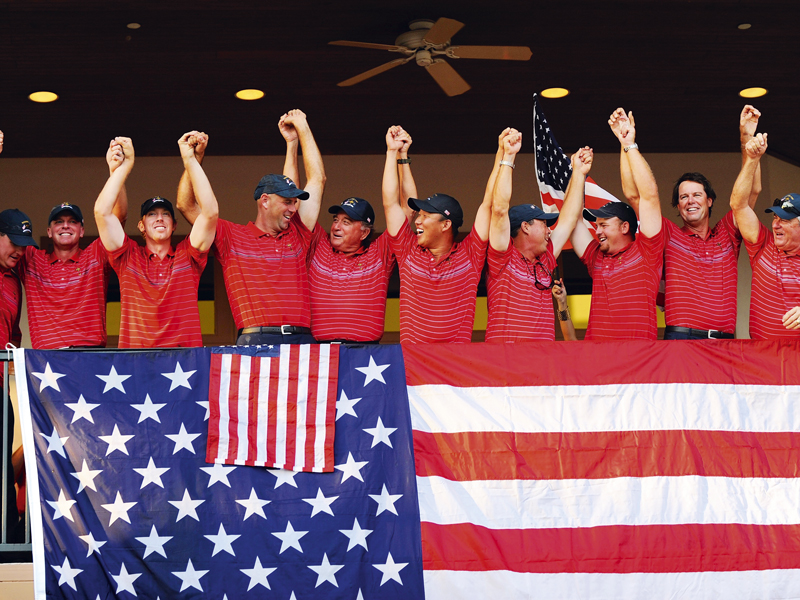Does The Ryder Cup Need An American Victory?
Does The Ryder Cup need the USA to triumph at Hazeltine? Fergus Bisset discusses


Subscribe to the Golf Monthly newsletter to stay up to date with all the latest tour news, equipment news, reviews, head-to-heads and buyer’s guides from our team of experienced experts.
You are now subscribed
Your newsletter sign-up was successful
Want to add more newsletters?

Delivered daily
Daily Newsletter
Sign up for all the latest tour news, gear reviews, head-to-heads and buyer’s guides plus features, tips from our top 50 coaches and rules advice from our expert team.

Once a week
Kick Point
Sign up to our free Kick Point newsletter, filled with the latest gear reviews and expert advice as well as the best deals we spot each week.

Once a week
Women's Golf Edit
Sign up to our free newsletter, filled with news, features, tips and best buys surrounding the world of women’s golf. If you’re a female golfer, you won’t want to miss out!
To maximise interest and excitement on both sides of the pond, does the great biennial team event need the USA to triumph at Hazeltine? Fergus Bisset discusses
Europe have won the last three Ryder Cup and eight of the last ten. A suggestion heard in golfing circles on this side of the pond in recent years has been that the Ryder Cup needs an American victory, to keep the excitement levels at fever pitch plus interest and expectation high on both sides. Is this the case? Is such a view a little superficial and patronising, or would The Ryder Cup be in a better place if the USA wins at Hazeltine?
If Davis Love III’s men triumph in Minnesota it will be only the second US victory of the 21st century. The USA prevailed comfortably at Valhalla in 2008 when the European captain, Nick Faldo, was thoroughly out-thought by his opposite number Paul Azinger. But, in the other six contests this millennium, Europe have come out on top.
European golf fans have become used to winning the great biennial event, and US players and supporters are hungry to silence their increasingly vocal supporters – think Patrick Reed’s shushing at Gleneagles!
When the USA dominated the contest in the mid-to-late 20th century, European fans held more hope than expectation, and most of the cheering was left to those waving the stars and stripes. How good it was for Europe to stun those expectant American fans at The Belfry in 1985 and to prove that the event was no longer a mere procession. Perhaps it is indeed time for the European devotees to receive a gentle reminder of the same sort?
The American public is spoilt for choice when it comes to top-level competition. They have a plethora of options of what, and who, to support, from baseball and basketball to NFL and NHL, track and field and tennis to NASCAR. There are those who think that if the USA continue to lose in The Ryder Cup, the fickle fans will switch off and move their allegiance to something else. This seems a rather malicious generalisation. The American golf fans love their sport and their players, and they will continue to support and believe in them in The Ryder Cup.
The US may have lost at the last three attempts, but these have been close contests. In 2010 at Celtic Manor, the event came right down to the wire. Graeme McDowell edged out Hunter Mahan in the final singles to leave the American so overcome with disappointment that he was unable to speak in the post-tournament press conference. In 2012, Europe pulled off one of the greatest comebacks in cup history. The European press dubbed the event ‘The Miracle of Medinah’. The press in the USA were not so enthused: the result was described in the Chicago Tribune as “inexcusable.”
Subscribe to the Golf Monthly newsletter to stay up to date with all the latest tour news, equipment news, reviews, head-to-heads and buyer’s guides from our team of experienced experts.
Last time out at Gleneagles, the 16.5-11.5 score appeared comfortable on paper, but the US weren’t out of it until well into Sunday’s singles. The point is, the Ryder Cup is an extremely close contest and that’s a key reason why it’s so enthralling. It’s very difficult to predict.
The USA will have an exceptionally strong team at Hazeltine. At the time of writing, their squad will contain four players from the top ten on the Official World Golf Ranking and ten from the top 20. The European Team will contain just five of the world’s top 20. If Europe is to beat this fine US team on home soil they will have to play some incredible golf. One could easily argue that it will actually be an upset if Europe wins, and an upset always stirs interest in a sporting event.
Europe have dominated in recent years, but they haven’t been streets ahead. Things are very different to when the cup was one-sided in the last century. Between 1933 and 1985 the USA lost just once. That was in 1957, when Dai Rees led GB&I to a memorable victory at Lindrick, albeit against a US side missing Ben Hogan, Sam Snead, Cary Middlecoff and Julius Boros. In total, the US have won 25 of the 40 Ryder Cups held to this point.
The Ryder Cup was changed greatly after the 1977 matches, with the inclusion of Europe into the contest. This extension was made to make the event more competitive, and it worked.
They say that absence makes the heart grow fonder and the long absence of the Ryder Cup from European residence certainly made the 1985 win, after 28 years of trying, all the sweeter. The longer the USA is denied victory, the more they will want it and the more passionate the celebrations will be when they secure it.
For the continued success of the Ryder Cup, it doesn’t matter which side wins at Hazeltine. What matters is that we have another closely and passionately fought match. We want to see it played in the best possible spirit with the competitors displaying not only the highest levels of determination, fortitude and golfing excellence, but also setting an example of sportsmanship and fairness. We want to see jubilant celebrations but also the magnanimity that makes golf great.
One of the most poignant images in recent Ryder Cups was that of Phil Mickelson smiling and applauding Justin Rose after the Englishman holed a monster putt across the 17th green at Medinah – an unbelievable moment.
The Ryder Cup will continue to be one of sport’s great events and both teams will receive phenomenal support this time out. Hopefully, no matter the result, everyone will shake hands at the end and acknowledge what a tremendous contest it has been.
David joined Golf Monthly in 2015 as a content editor for the magazine and regularly contributes to the website. He has worked in magazine publishing and editing since 2003. He is a keen golfer and up until recently was a member of Blackmoor Golf Club in Hampshire. He has covered various big events and tournaments for GM, the highlight of which was witnessing Tiger Woods win his 15th Major at Augusta in 2019. Email: david.taylor@futurenet.com
